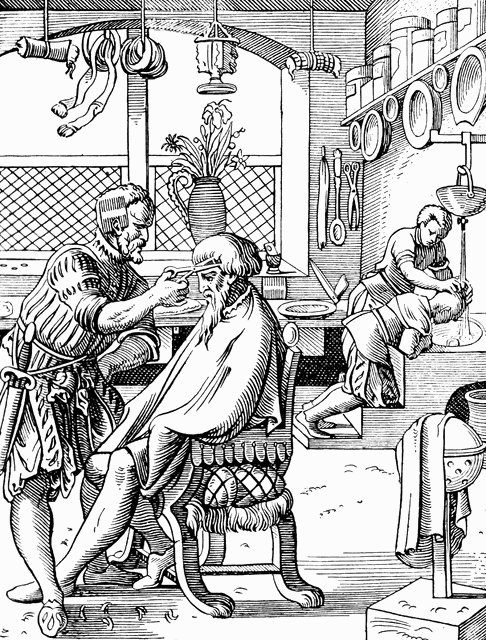This week in our Catechism Class we began reading Luther's open letter to Peter Beskendorf. Peter the Barber was one of Luther’s parishioners, and in his decision to write this letter, we truly see Luther as his caring pastor. Luther puts himself and his pastoral care right into then context and world of his barber:
A good and attentive barber keeps his thoughts, attention, and eyes on the razor and hair and does not forget how far he has gotten with his shaving or cutting. If he wants to engage in too much conversation or let his mind wander or look somewhere else he is likely to cut his customer's mouth, nose, or even his throat. Thus if anything is to be done well, it requires the full attention of all one's senses and members. ... How much more does prayer call for concentration and singleness of heart if it is to be a good prayer!
Carl Trueman of Westminster Theological Seminary in Philadelphia, PA summarizes Luther's Letter to Peter the Barber:
The whole letter is cast as advice to Peter based on Luther’s own practice. When he becomes cold in prayer, he says, he flees to his room to read the Psalms or, if it is the right time, to church to hear the psalms sung and read. He also repeats to himself the Ten Commandments, the Apostles’ Creed, and sayings from Christ, Paul, or the Psalms. He also tries to frame the day with prayer: make it the first business of the day, he advises, and the last thing you do at night. Earthly callings must not be neglected by reason of prayer; but prayer must be the priority. Prayers should not be long and empty babbling; rather they should be structured around the Lord’s Prayer and meditation upon the Ten Commandments ... All this Luther sees as warming the heart and moving us towards prayer that spontaneously cries out to God.
Even though I had thought of it mainly as a fitting conclusion for our class, studying this letter proved to be so much more than that. While our conversations had been intense every week, the conversation felt deeper and more powerful as the church leaders gathered experienced the pastoral care of Pastor Luther. Some asked questions, others marveled, some shed tears and several said, "We didn't know how deep this catechism stuff is". We got through only half of the letter, and decided to add at least another week.
In patiently and simply talking about his own everyday faith, Pastor Luther establishes a climate of comfort and trust, modeling how God wants to be with all of us. Our group was particularly taken with two aspects: Luther's confidence in God's promise and his emphasis on listening to the Spirit of God.
GOD'S PROMISE. When he gets to the end of his discussion of the Lord's Prayer, Luther makes, as always, a big deal of the word "Amen", saying,
Finally mark this, that you must always speak the Amen firmly. Never doubt that God in his mercy will surely hear you and say "yes" to your prayers. Never think that you are kneeling or standing alone, rather think that the whole of Christendom, all devout Christians, are standing there beside you, and you are standing among them, in a common, united petition which God cannot disdain. Do not leave your prayer without having said or thought, "Very well, God has heard my prayer; this I know as a certainty and a truth." This is what Amen means.
These words don't just convey Luther's trust in God, but shows the almost childlike intimacy of his relationship with God. It's like he is saying, "I know when I ask something of my Daddy, it's as good as done, so I won't worry about it. He's there for me. I am his child; he is my Daddy. That settles it."
LISTENING TO THE SPIRIT. In the same section, Luther talks about how prayer (when it is nothing but mindless repetition) can become "idle chatter and prattle". Almost like that of a modern therapist, his advice is greater creativity and flexibility: "... It may happen occasionally that I may get lost among so many ideas in one petition that I forego the other six", but the flexibility is necessity for more than just a more relaxed disposition:
If such an abundance of good thoughts comes to us we ought to disregard the other petitions, make room for such thoughts, listen in silence and under no circumstances obstruct them. The Holy Spirit himself preaches here, and one word of his sermon is far better than a thousand of our prayers. Many times I have learned more from one prayer than I might have learned from much reading and speculation.
"The Holy Spirit himself preaches here". In this passage we encounter Luther as the mystic he was, an aspect of our Reformer that oftentimes gets lost (even though it can be found in some of his hymns), emphasizing that rather than accumulating more and more knowledge, the People of God should allow themselves to get close to the source of all knowledge, the Holy Spirit.
The Spirit of God comes in silence and in deep contemplation, when the praying person is truly emptying himself or herself of all "reading and speculation", and makes room for the "sermon". It has been said that a mystic is someone who "melts into God" -- true intimacy indeed.
O God, our refuge and our strength: You raised up your servant Martin Luther to reform and renew your Church in the light of your word. Defend and purify the Church in our own day and grant that, through faith, we may boldly proclaim the riches of your grace which you have made known in Jesus Christ our Savior, who with you and the Holy Spirit, lives and reigns, one God, now and for ever. Amen.

No comments:
Post a Comment